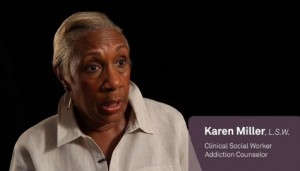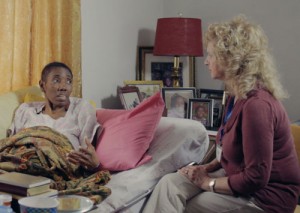Who Cares for the Caregiver?
Early in her career, a social worker tried to help a child who was the son of a prostitute.
The child told her about his harrowing life. His mother suffered from mental illness, was unable to properly care for her children and the boy had taken on the role of a parent.
“The interaction was so upsetting for the social worker that she could not work for the rest of the day, especially as she experienced profound grief toward this child,” said Philadelphia social worker Vic Compher, who is collecting interviews for a documentary film about secondary traumatic stress called “Caregivers.”
“It was overwhelming – she had to go to her own therapist,” Compher, LCSW, added. “She had to learn to find a boundary and to be compassionate –but also to protect herself emotionally.”
Secondary traumatic stress, or compassionate fatigue, are physical and emotional responses that can occur among social workers, doctors, nurses and other professionals who work with highly traumatized people. Symptoms can include intrusive thoughts, anxiety, sleep disturbance, flashbacks, appetite changes or depression.
Compher first became aware of the disorder in the 1990s when he was an administrator in the public child welfare system. He saw how the near death or injury of a child not only affected staff that worked directly with the child but the whole agency.

Social worker Karen Miller talks about how she was traumatized after talking to a client whose mother ran a brothel. Screenshot from Caregivers documentary trailer.
Compher and others teamed with the University of Pennsylvania to develop a grief assistance program for social workers that included peer counselors, support groups, an informal debriefing process and an annual Day of Remembrance to honor the memory of the children who had died and the professionals who had worked with them and their families.
Now Compher is working to complete the “Caregivers” film to let social workers and other professions know there is help available if they experience secondary traumatic stress.
There is a trailer of the film on the “Caregivers” website and a 21-minute version of the film available that is already being used in workshops. Compher hopes to eventually release a 50 to 80-minute feature documentary, depending on how much funding his team can generate.
“We are not only looking for stories of secondary trauma but also looking for positive examples of progressive organizations that are aware of the problem and trying to do something about it,” he said.
Visit the Caregivers Film website and Facebook page to learn more about the project and how you can get involved. Feel free to contact viccompher@comcast.net with questions or how to obtain a workshop version of the film. To learn more about how social workers help people deal with grief visit the National Association of Social Workers’ “Help Starts Here” Grief and Loss website.
| Leave A CommentAdvertisement
2 Comments
Leave a Comment
You must be logged in to post a comment.




On facebook,SWSpeaks asked, what do you do to avoid secondary stress? here is my answer; 30+ years on the job: evenings & nights in a trauma center; “behavioral sciences” faculty in a busy university hospital / family medicine residency; Team Leader for an urban police departments “crisis team;” CISD teams for hospital, law enforcement, fire& EMS; Disaster Mortuary Service – (OKC bombing & WTC 9/11,) ARC –DMH volunteer…. (Fires, tornadoes and bombs, OH MY!)
What do I do?
1. I accept that there is a force at play beyond my comprehension and thus, shit happens.
2. When shit has happened, I may not be able to change that reality but I can make a difference in how that shit is experienced. Maybe I can’t make bad stuff go away but I can make it a little more tolerable, less painful, more humane. Maybe I can help folks find hidden strengths and resilience and plant a seed for healing.
3. I nurture my personal resources and compartmentalize MY supports. (so as not to overwhelm those that I rely upon.)
4. I’m not ashamed to cry. (so sometimes I do: there is some sad shit we sometimes deal with)
5. I find ways to honor those I’ve encountered in difficult situations
6. I write. (personal journal, poetry, professional essays and articles)
7. I teach about this stuff in professional conferences, CEU offerings, in the classroom, and even in my churches “adult education” series.
8. And I smile a lot: honestly knowing that my work has made a difference.
9. Oh, and recently I’ve been regularly reminding my legislators of just how common it is that social workers have to work with people whose children, or spouses, partners, loved ones, parents, siblings, or class mates have been shot. And what it is like to sit with them and listen to them and hold their hands, or to watch a cardiac monitor spike and then go flat, and even how to get fresh blood out of you newest pair of work pants. See, I believe that sometimes incomprehensible forces can be impacted through sound education and reasoned legislation.
And then, I sleep very well.
Thank you for your dedication related to this trauma of being a “caregiver”. Compassionate care is the role I work for my clients however this is also the care that leads to burnout of my soul and mind. What I do daily for my profession is what I have to be Mindful of what I do for myself and learn to be Selfish with a capitol S. ” Its okay to say No in order to give power to all of my Yesses”